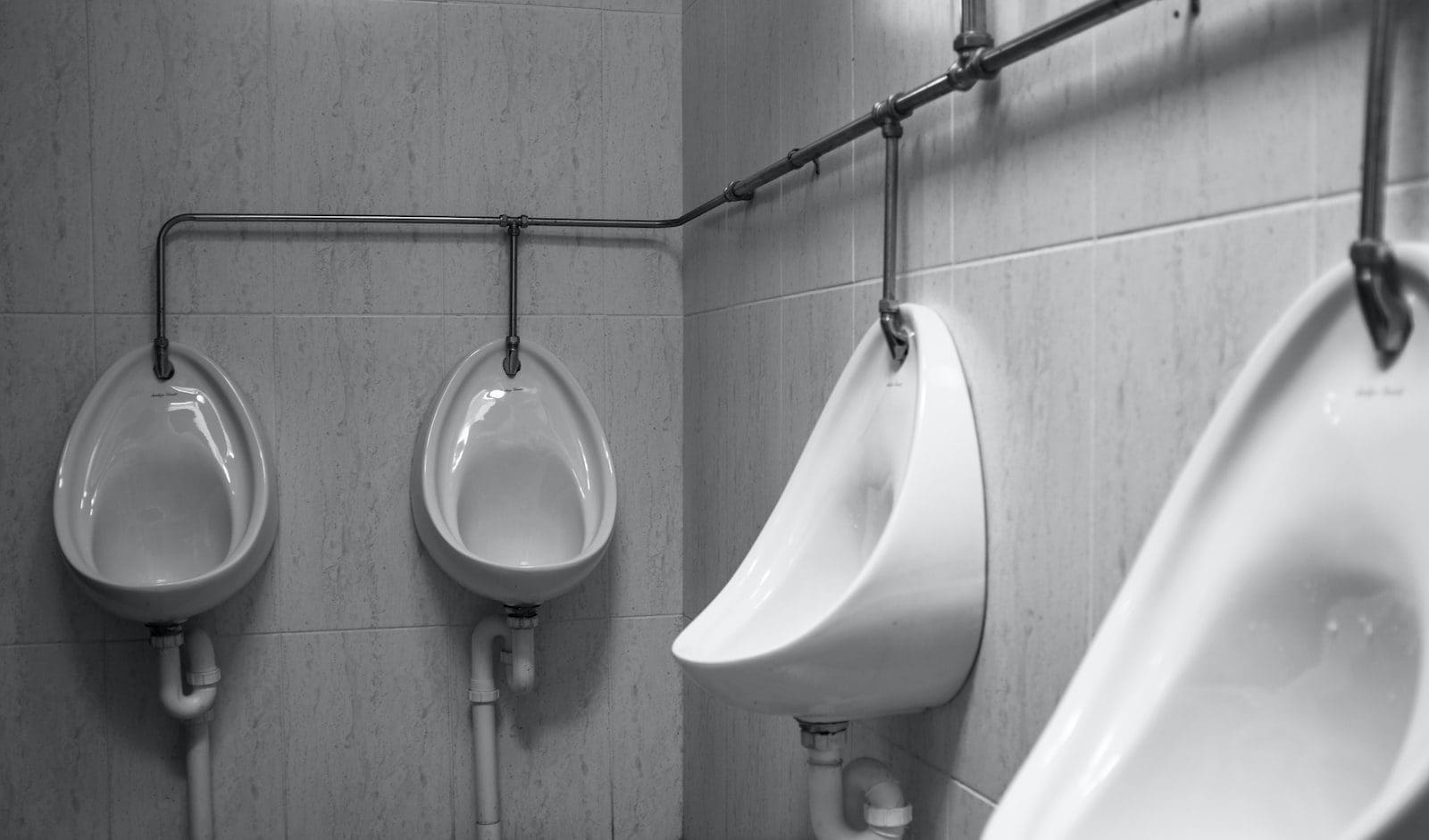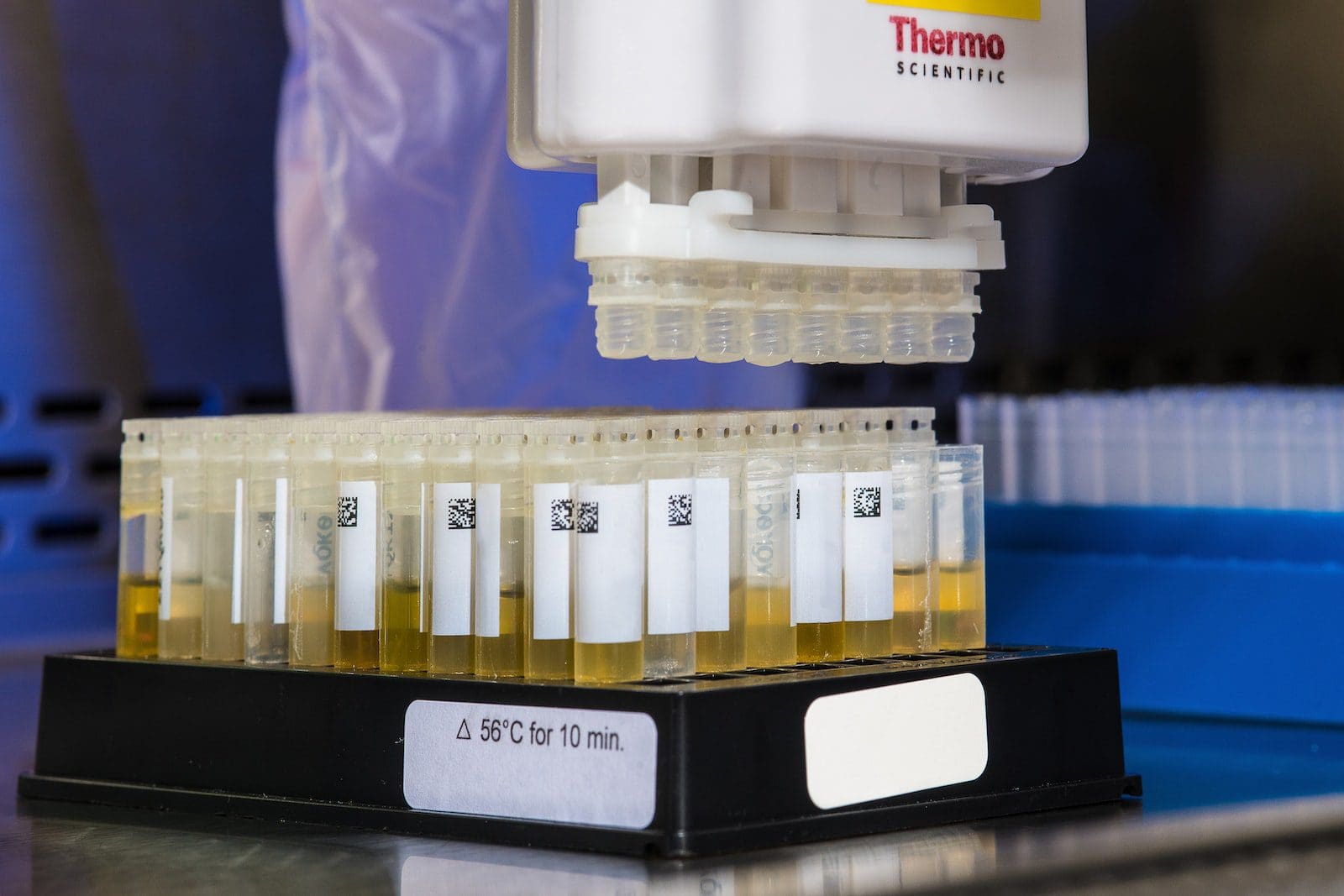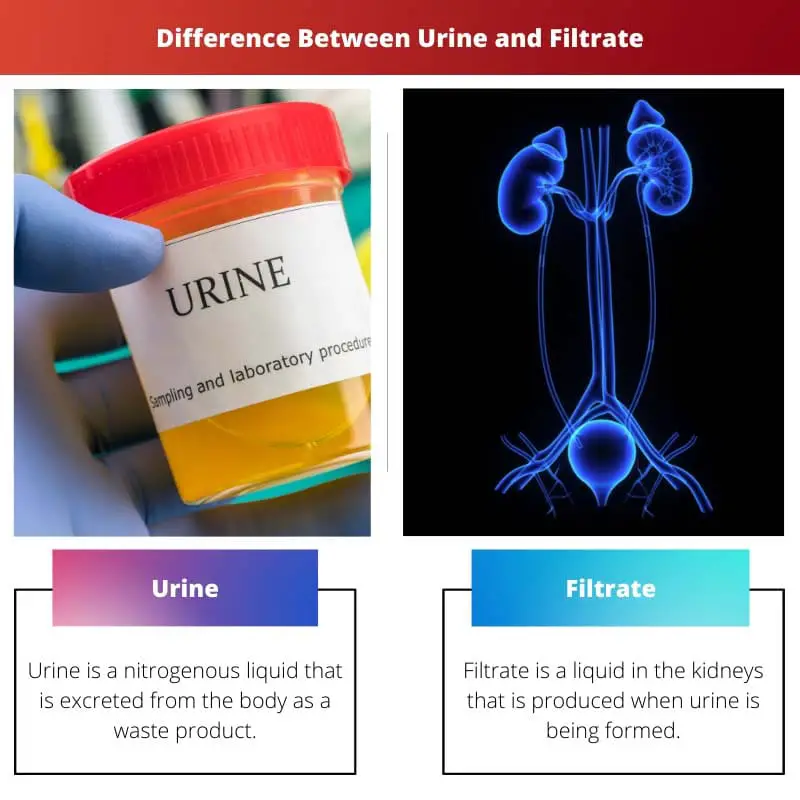The main function of the kidneys is to filter out unwanted substances and thereby remove them from the body. This is a natural process that ensures that a person remains healthy.
Urine and filtrate are two liquids that are formed during this process. Even though both are related to one another, there are some key differences between them.
Key Takeaways
- Filtrate is the liquid produced by the kidneys during the process of filtration.
- Urine is the final waste product expelled from the body, formed by modifying filtrate through reabsorption and secretion.
- The kidneys maintain electrolyte balance and remove waste products from the blood by producing filtrate and converting it into the urine.
Urine vs Filtrate
The difference between urine and filtrate is that urine is the nitrogenous liquid created at the end of the nephron in the kidneys and is removed from the body through the process of urination. On the other hand, filtrate is the liquid in the kidneys that is filtered out from the blood when urine is being formed.

Urine is a liquid form of waste that is produced in the kidneys. It is created when blood is cleaned out and is then removed from the body through urination.
The composition of the liquid includes water and other dissolved waste products. It flows from the kidney, uterus, urinary bladder and then finally through the urethra.
Filtrate is a liquid created in the kidneys when urine is being formed. It is composed of water, glucose, urea, uric acid, creatinine, and various other ions. The process of its formation is termed filtration.
This takes place only in the glomerulus, which is present in the Bowman’s capsule.
Comparison Table
| Parameters of Comparison | Urine | Filtrate |
|---|---|---|
| Definition | Urine is a nitrogenous liquid that is excreted from the body as a waste product. | Filtrate is a liquid in the kidneys that is produced when urine is being formed. |
| Location | Urine is formed at the end of the nephron in the kidneys. | Filtrate is formed only in the glomerulus inside the Bowman’s capsule. |
| Composition | Urine is composed of water, creatinine, sodium, potassium, chloride, and other tiny organic molecules. | Filtrate is composed of water, glucose, urea, uric acid, creatinine, and various other ions. |
| Formation | Urine is formed after the processes of filtration, reabsorption, and secretion. | Filtrate is formed during the first step of the process of urine formation. |
| Importance | Urine gives information about underlying diseases in the body. | Filtrate only gives information about the overall health of the kidneys. |
What is Urine?
Urine is a liquid produced in the kidneys that is excreted from the body through the process of urination.
It is a waste product that goes through filtration, reabsorption, and secretion while flowing from the kidney, uterus, urinary bladder and then finally through the urethra.
Nephrons in the kidneys filter blood from which this waste material is separated. This material consists of water, creatinine, sodium, potassium, chloride, and other tiny organic molecules.
Under normal conditions, a body produces approximately 1.5 to 1.8 litres of urine on a daily basis. The liquid is used by medical professionals who perform various tests on it for diagnosing various diseases that can affect the entire body.
For example, the levels of hydration of a body are checked by assessing the colour of urine produced. Moreover, even the kind of diet a person takes can be found out by testing urine pH. The odour of the liquid can be used to detect the age of urine.
It also checks for glucose and ketones, which further determine whether a person is suffering from a urinary tract infection. Some problems that affect the process of urination include kidney failure, enlarged prostate, bladder control problems and blockage of the bladder.

What is Filtrate?
Filtrate is a liquid that is produced during the first stage of urine formation. The rate at which it is produced is used by doctors to check whether the kidneys are healthy or not.
The liquid is created in the glomerulus present in the Bowman’s capsule. This happens when the heart produces hydrostatic pressure to push water and solute through a membrane.
The process of filtration is passive due to the fact that the filtrate fluid does not use any cellular energy. A healthy kidney is expected to produce approximately 180 litres of filtrate in men and 150 litres in women on a daily basis.
Almost 99% of filtrate then goes through the process of reabsorption to form urine. This makes filtrate an important liquid involved in the process of urination.
Filtrate is composed of water, glucose, urea, uric acid, creatinine, and various other ions. The rate at which these substances are filtered or separated from the blood is known as the glomerular filtration rate.
It is normal for this rate to fluctuate throughout the day as the body performs different activities. When a person is affected by a kidney disease, the glomerular filtration rate changes. Thus, medical professionals can check for kidney problems by assessing this.

Main Differences Between Urine and Filtrate
- Urine is a nitrogenous liquid that is excreted from the body as a waste product, whereas filtrate is a liquid produced while urine formation occurs.
- Urine is formed at the end of the nephron in the kidneys, whereas filtrate is formed only in the glomerulus inside the Bowman’s capsule.
- Urine is composed of water, creatinine, sodium, potassium, chloride, and other tiny organic molecules, whereas filtrate is composed of water, glucose, urea, uric acid, creatinine, and various other ions.
- Urine is formed after the processes of filtration, reabsorption, and secretion, whereas filtrate is formed during the first step of the process of urine formation.
- Urine gives information about underlying diseases in the body, whereas filtrate only informs about the health of the kidneys.

- https://journals.sagepub.com/doi/abs/10.3181/00379727-36-9255p
- https://pubs.rsc.org/en/content/articlehtml/2015/ew/c5ew00009b

The information provided in this article is exceptional and extremely useful for anyone interested in the topic.
I couldn’t have said it better. This is an incredibly well-composed piece.
Fascinating read. The comparison table clearly differentiates urine and filtrate. Great work!
Impressive analysis, well done!
Couldn’t agree more. The detailed explanation is truly enlightening.
A very well-researched and detailed article. Impressive!
Absolutely, the level of detail provided here is truly commendable.
This article brilliantly explains the differences between urine and filtrate. Thank you for the enlightening read.
Incredibly insightful article. The comparison between urine and filtrate has been explained with utmost clarity.
I couldn’t agree more. This article is a goldmine of knowledge.
Absolutely, this piece is both educative and engaging. A fantastic read!
Very well-written and all-encompassing information! A perfect article for knowledge seekers.
Very informative and interesting article. This helps in understanding the importance of kidneys and its functions.
I agree, this article is quite an eye-opener to how the kidneys function.
Absolutely, this level of intricate detail is much appreciated. Thank you for sharing!
This article is amazing, it provides a comprehensive understanding of the functions of the kidneys.
Absolutely, the depth of knowledge shared here is truly commendable.
Indeed, the article is highly educational and insightful.